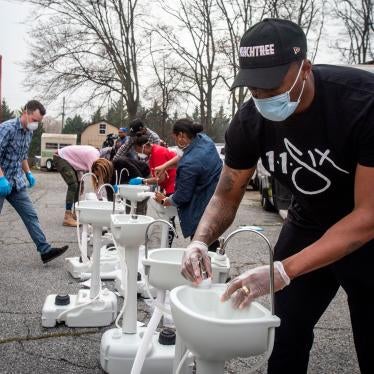(Toronto) – New police data developed during 2014 show that more than 1,100 indigenous women and girls have disappeared or been murdered in Canada since 1980, double an earlier estimate, Human Rights Watch said today in its World Report 2015. The Canadian government has resisted calls for a national inquiry into the violence, and instead has opted for half-measures that do little to address the structural problems underlying the violence.
“Canada owes it to the hundreds of victims and their families to get to the bottom of the violence that has brought so much suffering to indigenous communities,” said Meghan Rhoad, women’s rights researcher at Human Rights Watch. “Further, the government owes it to all the indigenous women and girls across the country who are asking ‘Am I next?’ to develop a national action plan that will protect them.”
In the 656-page world report, its 25th edition, Human Rights Watch reviews human rights practices in more than 90 countries. In his introductory essay, Executive Director Kenneth Roth urges governments to recognize that human rights offer an effective moral guide in turbulent times, and that violating rights can spark or aggravate serious security challenges. The short-term gains of undermining core values of freedom and non-discrimination are rarely worth the long-term price.
The Royal Canadian Mounted Police (RCMP) identified 1,181 cases of murders and disappearances of indigenous women and girls between 1980 and the end of 2012. The study found that indigenous women and girls are overrepresented among homicide victims – constituting 4.3 percent of Canada’s female population, but 16 percent of female homicide victims. In a grass-roots social media campaign to raise awareness of the continuing violence, indigenous women and girls have posted photographs to Twitter with the hashtag #AmINext.
Human Rights Watch research shows that the RCMP in British Columbia does not adequately protect indigenous women and girls from violence. Members of the police have also subjected indigenous women and girls to excessive use of force, physical assault, rape, and other sexual violence. Canada has inadequate police complaint mechanisms and oversight procedures, and no nationwide mandate for independent civilian investigations into all serious police misconduct.
A parliamentary report released in March did not recommend the steps needed to stem the violence – an independent national inquiry, a comprehensive national action plan, and an improved system for accountability for police misconduct.
“The government insists the murders and disappearances of indigenous women require no further study, which is exactly what they said before this year’s police study revealed the number of murders and disappearances of indigenous women and girls to be double previous estimates,” Rhoad said. “Clearly, the problem requires the comprehensive, independent scrutiny of an inquiry to determine how to address it.”
Canada generally has a solid record on core civil and political rights protections, but the sitting majority in Parliament has refused to take essential steps to remedy serious human rights concerns, Human Rights Watch said. Key concerns include the impact of Canada’s extractive industries abroad, legislative provisions enacted in November 2014 that endanger sex workers by criminalizing certain aspects of sex work, and the denial of rehabilitation and reintegration services to Omar Khadr, a Canadian citizen detained from the age of 15 in Guantanamo for 10 years and now imprisoned in Canada. In addition, Human Rights Watch raised concerns about a bill to implement the Convention on Cluster Munitions, citing provisions that run counter to the treaty’s spirit and letter. The bill became law in November 2014.






